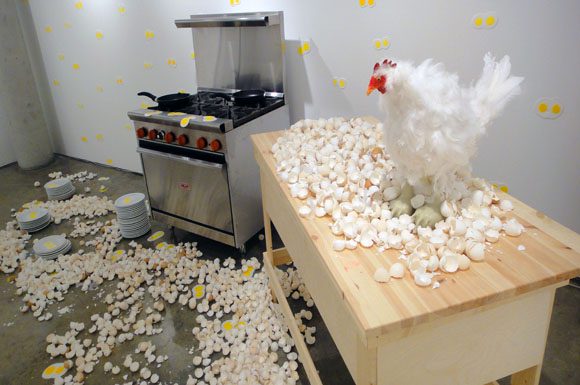Hanging behind the display glass along the walls of the gallery, quirky little carrots are glued on plates which lure in the passersby. Beyond the chalked Welcome sign at the entrance of the exhibit, a carefully thought out piece of art comes alive with the help of kinetics and sound.
Rita McKeough’s “The Lion’s Share” is in its fourth week of exhibition at the Dory McCarthy Gallery (DMG) at the University of Toronto Scarborough campus (UTSC). McKeough creates a simulated restaurant and uses found and created objects to raise questions regarding what is accepted as food.
Erin Peck is the outreach coordinator at the DMG. She says the DMG chose to exhibit this piece because of how simple and effective McKeough managed to express such an important yet often ignored topic.
“I don’t think she’s trying to tell you that eating animals is bad, it’s just about why are we eating animals and what is that relationship like,” Peck said. “It’s about the decision-making process regarding what we eat and why we are sometimes anxious about the choices that we make.”
Peck says that people should be more wary about what is going inside their bodies.
“I think it’s important to at least think about these things and be aware of why am I eating what, because these kind of things are pretty critical to the way we function,” Peck said.
The show has received a positive response.
Victoria Sue, 17, is a first year journalism student at UTSC. She says that although the exhibit is about food, there was nothing appetizing about it at all.
“I read about it and it’s like the carrots are seeing the chaos of the room and giving their opinions, and the hen in the kitchen is like cackling away – I think she’s gone mad that all of her eggs have hatched and are covering the walls,” Sue said, “I find that disturbing.”
Sraban Aziz, 24, is majoring in political science at UTSC. He thought the exhibit was different and he liked how it was presented in a way that’s easy for him to understand. When it comes to food, Aziz expressed that he’s not a picky eater, but he does give thought to where his meal came from.
“I’m in the military so we eat anything that’s served to us. I don’t care how it’s made but I want to know how my food is prepared,” Aziz said.
Aziz also says he’s clear about his relationship with animals.
“Food is food – I go hunting with my friends and I kill my own food. I also go to farmer’s markets and I buy live chickens and I eat them. I don’t see a problem with that.”
Peck thinks all feedback, good or bad, are good indications that McKeough’s message is getting through.
“The important thing that art does is it starts a dialogue and gets you thinking [about] issues that maybe you wouldn’t think about otherwise. I hope they come away thinking they had a good experience and the space gave them something really interesting to talk about,” Peck said.
“The Lion’s Share” will be on exhibit until Oct. 27.

